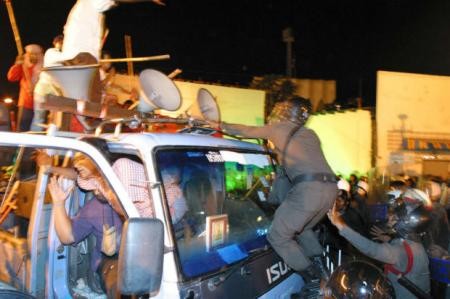2002 Songkhla gas pipeline protesters lose court battle
Vichayant Boonchote
27/11/2015
The court said Sant Sarutanond, the national police commander at the time, and other defendants had carried out their duties, while the plaintiffs had no evidence to prove abuse of authority by any of the officers.
Pol Gen Sant and the five policemen were hauled into court by 25 plaintiffs who accused them of using excessive force to end their demonstrations against the project.
The rally by more than 1,000 demonstrators took place in front of the JB Hotel in Hat Yai on Dec 20, 2002 a day before a cabinet meeting was to held at the venue. The clashes between police and the protesters, most of them from the site where the project was located, happened that night.
The clashes injured a score of protesters, who had tken to the streets in Hat Yai district demanding the project in Chana district be scrapped due to concerns about its effects on their livelihoods and the environment. The project also included a gas-separation plant.
About 60 people converged at the court in Muang district on Friday to hear the court's reading of the verdict, which took about an hour. Some held banners blasting the police who used force against the protesters more than a decade ago.
Pol Col Surachai Suebsuk, one of the defendants, said he was relieved at the result, saying the court's decision reflected the facts at the rally site. He was an inspector at the time for Muang police station in Songkhla in charge of the police operation.
The protesters outside the courthouse, however, felt differently and planned to appeal.
Rattamanee Pholkla, a lawyer for them, and Banjong Nasae, a plaintiff, said after the verdict that they will take the case to a higher court, as they had a right to hold the rally and officers who injured the demonstrators and damaged their property should be held responsible.
The sentence on Friday came after the Supreme Court in the province on Oct 21 dismissed riot charges against 32 defendants arising from their protest.
bangkokpost.com
Vichayant Boonchote
27/11/2015
The court said Sant Sarutanond, the national police commander at the time, and other defendants had carried out their duties, while the plaintiffs had no evidence to prove abuse of authority by any of the officers.
Pol Gen Sant and the five policemen were hauled into court by 25 plaintiffs who accused them of using excessive force to end their demonstrations against the project.
The rally by more than 1,000 demonstrators took place in front of the JB Hotel in Hat Yai on Dec 20, 2002 a day before a cabinet meeting was to held at the venue. The clashes between police and the protesters, most of them from the site where the project was located, happened that night.
The clashes injured a score of protesters, who had tken to the streets in Hat Yai district demanding the project in Chana district be scrapped due to concerns about its effects on their livelihoods and the environment. The project also included a gas-separation plant.
About 60 people converged at the court in Muang district on Friday to hear the court's reading of the verdict, which took about an hour. Some held banners blasting the police who used force against the protesters more than a decade ago.
Pol Col Surachai Suebsuk, one of the defendants, said he was relieved at the result, saying the court's decision reflected the facts at the rally site. He was an inspector at the time for Muang police station in Songkhla in charge of the police operation.
The protesters outside the courthouse, however, felt differently and planned to appeal.
Rattamanee Pholkla, a lawyer for them, and Banjong Nasae, a plaintiff, said after the verdict that they will take the case to a higher court, as they had a right to hold the rally and officers who injured the demonstrators and damaged their property should be held responsible.
The sentence on Friday came after the Supreme Court in the province on Oct 21 dismissed riot charges against 32 defendants arising from their protest.
bangkokpost.com



Comment